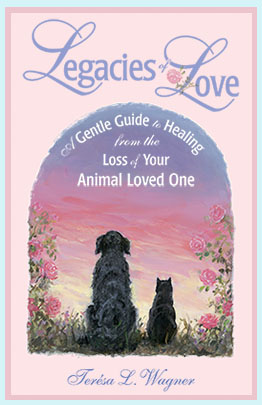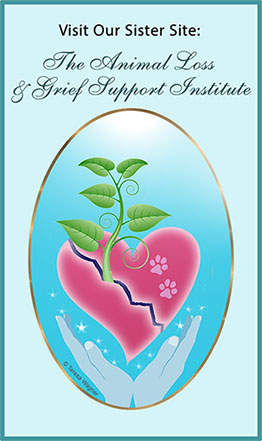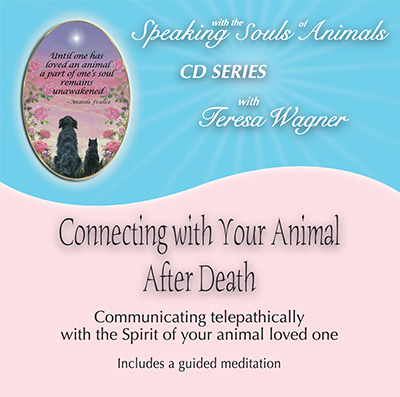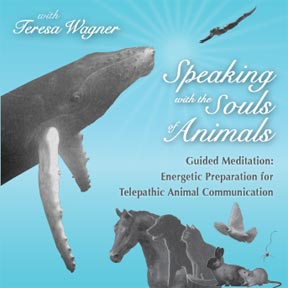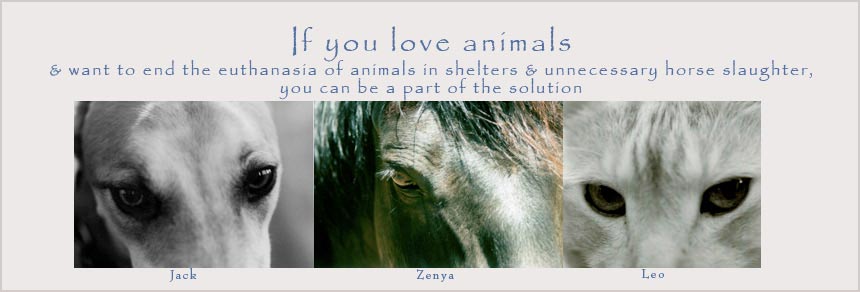Shelter Euthanasia
Impact on Shelter and Animal Control Staff
For every animal who dies in a shelter euthanasia room, there is a human outside the walls of that shelter responsible for its death.
Shelter workers do the dirty work for community members who continue to breed despite overpopulation, who surrender their animals, dump their guilt, and shift the blame onto shelter staff for a problem they created themselves.
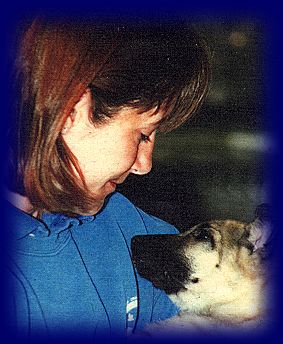
Have you ever wondered why people work at animal shelters? Have you ever thought or said, "Oh I couldn't work there, I love animals too much?" Interestingly, in response to both written surveys and verbal exercises in workshops I've conducted, involving several hundred shelter employees since 1994, the number one reason shelter workers have given over and over again for working in shelters is "because I love animals". They work there because they love animals, despite the pain and heartache they witness and feel themselves.
The next time you find yourself in a conversation with an animal shelter worker (or animal control officer or humane officer), instead of saying, "Oh I couldn't do your job, I love animals too much," try saying, "You must love animals a great deal to do the work you do." This type of comment, this acknowledgment, will go a long way toward boosting the morale of the people who care for the abused, neglected and abandoned animals of your community.
Shelter workers pay a high price of traumatic stress and compassion fatigue
I believe that the majority of front line workers in animal welfare organizations suffer from traumatic stress and compassion fatigue. Why? Because the work is the most emotionally complex and morally challenging of any trauma worker role in our society. Compassion fatigue is different from burnout in that the cause of compassion fatigue is always related to caring about, taking care of, or exposure to trauma victims, while burnout can result from any type of stress. For more than ten years I worked for a Fortune 500 corporation and facilitated stress management seminars for executives. They were not suffering from compassion fatigue, but from stress and burnout. Their stress was not caused from caring about the suffering others. The trumatic stress and compassion fatigue experienced by rescue and shelter workers is. Compassion fatigue is unique to certain roles and situations.
Post traumatic stress is experienced by the direct victims of trauma (in shelter and rescue situations, the animals). Secondary traumatic stress (compassion fatigue) is experienced by those who help and are exposed to these victims of trauma. As many of us know, being around the pain and suffering of others can be "emotionally contagious." It's difficult to see and care deeply about the suffering of others without feeling some pain ourselves.
The symptoms of PTSD and compassion fatigue are the same and can include: recurrent nightmares, recurrent and intrusive distressing recollections of the trauma, flashback episodes, intense psychological distress at exposure to cues that symbolize or resemble an aspect of the traumatic event, restricted range of feelings (i.e. blocking feelings), difficulty falling or staying asleep, irritability or outbursts of anger, difficulty concentrating, hyper vigilance and exaggerated startle response.
The factors impacting the severity of these traumatic stress symptoms include: the duration of the experience/exposure, potential for recurrence, degree of exposure to death, dying and destruction, degree of moral conflict inherent in the situation, and the extent to which the role is direct or indirect. Every one of these factors exists in the shelter/animal control/rescue workers job:
- Caring for traumatized animals is a daily event, not occasional. It is on going, not episodic.
- Exposure to death is frequent at many shelters
- Degree of moral conflict is extremely high for humans who deeply love animals and may be in a role of choosing who will live and who may die, and may be in the role of personally performing euthanasia
- Their role is seeing these animal victims of trauma is direct and hands on, along with direct and on-going exposure to the very perpetrators of animal abandonment, neglect or abuse
It is not surprising that shelter workers' scores on a Compassion Fatigue Self Test (Charles Figley 1995) are extraordinarily high. Figley's test scores are clustered in categories of extremely low risk, low risk, moderate risk, high risk and extremely high risk. In over 350 of these tests administered in my Compassion Fatigue workshops for shelter staff, every single shelter workers' score was in the extremely high risk range. Clearly, the shelter/animal control/rescue workers of our communities pay a very high emotional price for the care they give our homeless, abandoned, neglected and abused animals.
A Plea
- Please don't place the blame of overpopulation and shelter euthanasia on shelter staff. It is a community caused problem, and takes a whole community to solve:
Adopt & rescue, spay & neuter, and keep your animals!
- Support your local animal shelter with a donation of money, volunteer time, fostering animals, or needed goods such as towels, pet food, etc.
- The next time you speak with an animal shelter employee or animal control/humane officer, take the time to thank them for taking care of your community's animals in need.
Mary and Frankie

Mary Flick has worked at both the SPCA of Monterey County, California as well as the Virginia Beach SPCA in Virginia Beach, Virginia. During her years at the Monterey shelter, Mary fell in love with a little puppy named Frankie. She had a fractured leg which required special attention and rehabilitation time. Mary nursed her through this, fostering her until she was well enough and socialized enough for adoption. As they became closer and closer, Mary knew it would be extremely hard to let her go, but she already had other animals at home and knew the best thing for everyone would be to let little Frankie be adopted. The very week she seemed well enough for this, Frankie contracted Parvo. Despite efforts to help her overcome it, Frankie worsened and had to be euthanized. Mary held little Frankie and loved her and cried hundreds of tears for her as she took her last breath. This is a poem and letter she wrote to her:
You are a little angel now in heaven and probably happier than ever. It helps me to know you are no longer suffering, but Frankie, it's hard to me to let you go. So I bought an angel of love that I wear against my heart in honor of my memory of you. I will never forget you ever. You touched my heart in a way no other dog in the shelter ever has. I know that because I felt the pain in my heart for you. I know someday we will meet again ,and I will see that little face I saw when I first laid eyes on you. So happy, full of energy and love. This is memory of you:
FRANKIE
- F is for the frisky girl you were, and also for your fractured leg.
- R is for all the times we ran together on my lunch hour
- A is for the angel you are, and the little angel you were
- N is for the nibbling you always did to my fingers
- K is for the kindness and kisses that you have given me
- I is for the intriguing look of your little face, even with those big ears
- E is for everything you gave me, and for what I gave you... LOVE
Questions to Ponder
Read the following story, and for just a few minutes try to pretend you are the stray dog and this is your story. Then, read the questions which follow the story and answer from your heart.
My Life as a Dog
I used to have people. I lived in their back yard. They bought me from a person who "bred" lots of dogs who looked just like me. They were really nice to me when they first saw me and brought me home. But soon they never stayed around to do much with me. They did bring food, though the water was hardly ever changed. It got kind of boring--no other dogs, no fun with people, and we didn't go on any walks. They just didn't seem interested in a close relationship. So I started digging up the yard for something to do, and when I smelled or heard other dogs nearby I barked a lot. My people got really mad about the holes (I still don't understand why--they never even spent time out there) and attached me to a chain which was stuck on the side of a building. I hated that. What did they expect me to do with my days and nights when I couldn't even move more than ten feet! Finally one day, I had enough. I broke free and found my way out.
First it was really cool. Freedom! I mated with the female I knew was out there and then I ran and ran. I found a couple of other dogs to play with. They told me about their people and how they actually lived inside houses most of the time. But at nighttime, they weren't around outside. After awhile I got hungry, and tired. But I kept going. One day I got to a BIG street with a lot of big cars going really fast. Some human in a uniform stopped his truck and called to me. I went right to him, jumped up and licked him! He was so nice and so interested in me! He liked me right away. He took me to a place with LOTS of dogs. It was very different there from the back yard. Man, I never saw so many dogs. Everybody barked and nobody got yelled at for it. I had my own place, inside and out, and food came regularly. The space was a little small, but there was no chain.I liked that. Everybody who walked by gave me a good feeling, they told me I was handsome, a good boy and all kinds of good stuff. And once a day some lady came and put me on a leash and took me for a walk. She was very, very kind and gave me treats. I liked this place.
After just a couple of days a lady and her little boy came by and took me for a walk and played with me in the big grassy yard outside. When they saw me they said "Oh, he's a Golden!" I didn't know what that meant but they seemed impressed. They said they wanted a "pure" dog, whatever that means. After an hour or so these people took me home! And it was wonderful! They kissed me and hugged me and I hugged them right back--I stood on my back paws, you know, so I could reach them for a big hug. I loved it! Sometimes I would knock the little boy over and we would roll around together. He loved this but his Mom didn't. I loved being in the house! There were so many things to smell and see! The Mom got mad though cause I knocked some things over. But at first she forgave me because I slept with the little boy and he was very, very happy with this. He loved me, I know he loved me. I thought I had found a real family to love and to love me. I felt like a real dog now. But then after a few weeks the Mom got real mad cause I urinated in the house sometimes. I still didn't quite understand when I was supposed to go outside or inside. Well, next thing you know she took me back to the shelter and told the people there that I wasn't "trained," whatever that means.
I didn't understand this at all. And my new friend the little boy cried and cried. Well, I was back at this place with all the dogs which I liked before, but now that I knew how nice it was to live in a house it didn't seem like much fun. I heard some of the people there say that nobody wanted to take me home because I wasn't "trained". I didn't know what this meant. I didn't know what was wrong with me. Plus I started talking with the other dogs and most of them were confused and upset because they had had people too and didn't understand why they brought them here. It was getting very depressing. It was better than the back yard with the chain because the people here really seemed to love me, but it wasn't like sleeping with the little boy. I really, really missed him. One day one of the nice people who fed me each day put a leash on me and took me down the hall to a room I hadn't seen before. The people gave me treats and kisses. I loved that. Then they gave me a shot and I got really tired. Soon I wasn't tired anymore... I was in a different place. I was very free and totally at peace. There were angels there who smiled and loved me more than any love I had ever felt--except for the little boy of course. I could still see the people who gave me the treats and the shot. They were very sad. The lady was crying and I felt the man send me a prayer from his heart. I sent them a prayer and love right back. I hope somebody loves them like the little boy loved me and that they get to live in a house.
Questions to Ponder
1. Why do you think this dog died?
2. If this dog knew and understood everything you do about dogs, where do you think the dog might place blame for his death? WHY?
3. If you were a dog like this in a shelter and were told that right now there just weren't any people to take you home, which of the following options would you choose and WHY?
- Live in a kennel the rest of your life (living in limited space, with limited exercise and affection)
- Take my chances living on the streets without food, shelter from extreme weather, help when I'm sick or injured, and without love
- Pray that some person is willing to take the time to "train" me so I can be deemed worthy enough to keep
- Die a peaceful death through euthanasia
4. What actions do you think shelters should take to prevent the death of animals like the one in the story?
5. What actions do you think dog owners should take to prevent the death of animals like the one in the story?
6. What might you be willing to do to stop dogs like this from dying?
More Questions to Ponder — How Would You Feel. . .
Would you want to be abandoned by your new spouse because his child develops an allergy to you?
Would you drop off your human child at an orphanage because you moved into a new home that does not allow children? Or would you only seek homes that allow children?
How would you feel if your pet, without talking with you about it, brought home another pet to live with you, and started to sleep in your bed with the new pet, and told you, "Well I still love you, but I have this new dog now and you aren't allowed in the bed anymore because the new dog doesn't like people. You have to sleep in another room now-- the laundry room. I mean, you can't expect me to choose you over another animal! I love you but you're just a human. You'll get used to the laundry room and I'll see you at breakfast."
How would you feel if your horse told you: "I am leaving you to go live with a different person because you are getting old, and can no longer compete the way you used to. I want to advance my performance abilities and win more shows, and you just can't keep up. We had some wonderful times, and I did love you, but I need to move on. Please don't take it personally, but you can't expect me to live out my life with you if you can't keep up with my abilities. After all, isn't the purpose of the horse/human relationship for the horses' needs to be met? You just don't meet mine anymore. My new person has much more skill and I know we will go places. These relationships take work, and I really am sorry but you can't expect me to stay with you for my whole life just for love. Money and winning are involved which are far more important to me than love."
Would you like to do something to stop the death of shelter animals and to see every animal out of a cage and into a home? You can. There are practical steps that every individual who loves and lives with animals can take to resolve the problem.
The tragedy of masses of animals being euthanized in shelters across the United States is a deeply disturbing and challenging problem, emotionally and morally, for all of us who love animals. It is a complex problem in which the symptoms are often erroneously labeled the problem, and one in which the caregivers are often mislabeled the culprits. Even as a lifelong animal lover, for many years I was not aware that the United States has a companion animal overpopulation epidemic and that millions of unwanted animals die in shelters every year. And I was not at all aware that some of my own actions, such as buying a cat from a breeder, were inadvertently contributing to the problem. The purpose of this portion of the web site is to raise consciousness about the facts of overpopulation and shelter euthanasia, and to explore the symptoms, root causes and potential solutions to the problem, especially how every single one of us as individuals has the power to make a huge difference to save animals' lives.


